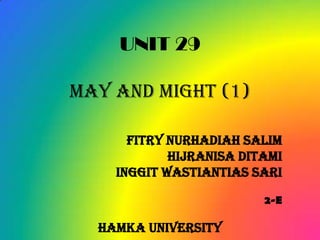Report
Share

Recommended
More Related Content
What's hot
What's hot (20)
Viewers also liked
Viewers also liked (20)
May and Might
- 1. UNIT 29 MAY and MIGHT (1) Fitry Nurhadiah Salim Hijranisa Ditami Inggit Wastiantias Sari 2-E HAMKA UNIVERSITY
- 2. A B C
- 3. A We use may or might to say that something is a possibility. They have the same meaning. You can say : “It may be true” or “it might be true” (=perhaps it is true)
- 4. The negative forms are may not and might not (or mightn’t) Example :
- 6. B You might have left in the shop. (= perhaps you left in the shop) She may have been I can’t find my bag anywhere. asleep. (= perhaps she was asleep)
- 7. She might not have known about it. (= perhaps she I was surprised that Sarah didn’t know) wasn’t at the meeting. He may not have been I wonder why Colin was in feeling well. (= perhaps he such a bad mood yesterday. wasn’t feeling well)
- 9. The phone’s ringing. It could be Tim. (= it may/might be Tim ) You could have left your bag in the shop. ( =you may/might have left it...)
- 10. C But couldn’t (negative) is different from may not and might not She was too far away, so she couldn’t have seen you. ( =it is not possible that she saw you) A : I wonder why she didn’t say hello. B : She might not have seen you. (= perhaps she didn’t see you; perhaps she did)
- 11. THANK YOU
